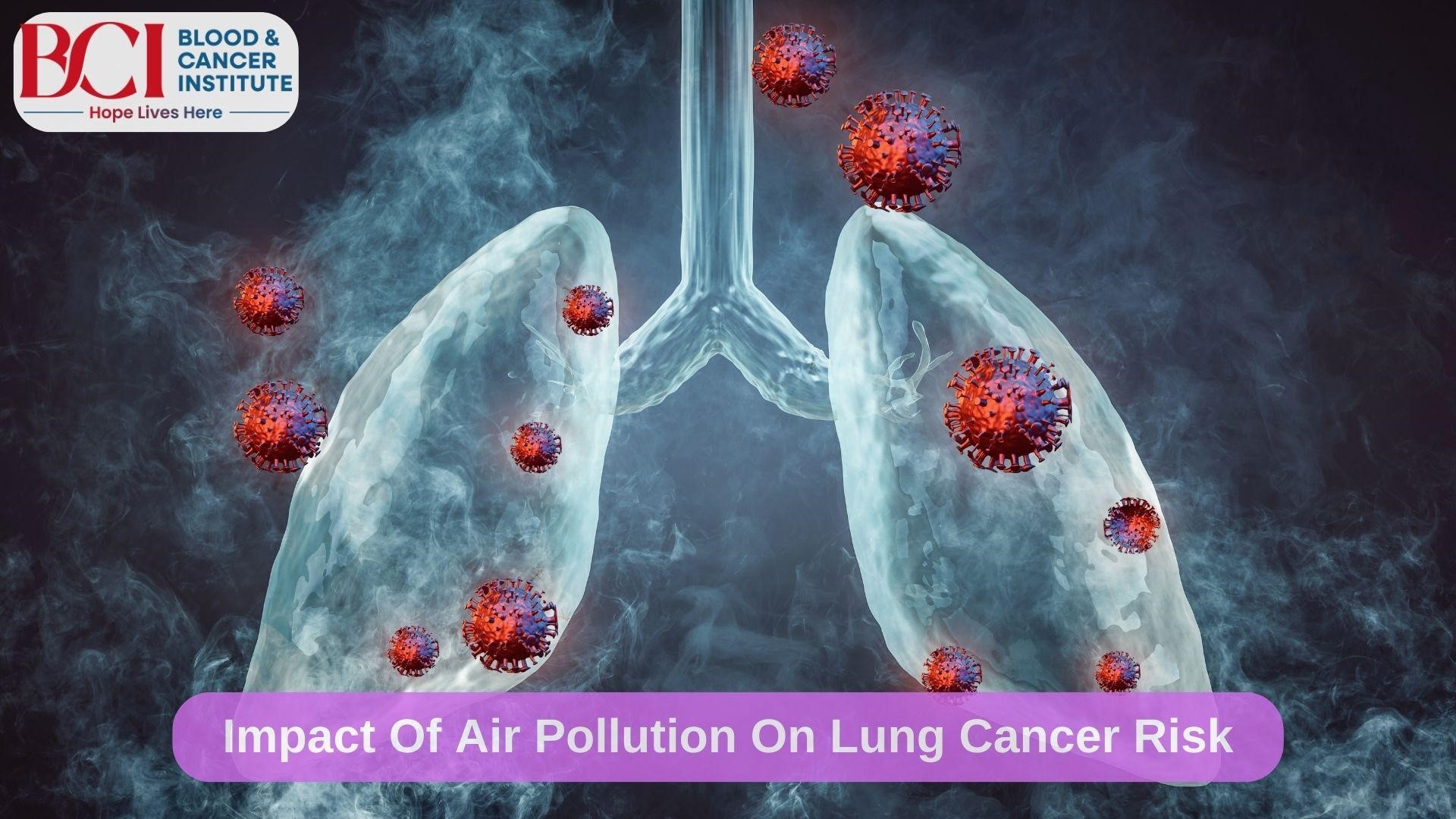
- By : BCI
- Blog
- Comments: 0
The Impact of Air Pollution on Lung Cancer Risk: What You Can Do to Protect Yourself
Air pollution is an increasingly urgent health concern worldwide, affecting millions of people each day. Its impact on respiratory health is widely recognized, but fewer people are aware of the link between air pollution and lung cancer. Studies have shown that long-term exposure to polluted air is a significant risk factor for lung cancer, even in non-smokers. Understanding this connection and taking steps to reduce exposure to pollutants can help protect your health. Our experts at BCI- Blood and Cancer Institute, considered as the best lung cancer specialists in Surat, have put together a guide about air pollution, its impact on lung cancer risk, and how you can mitigate the risks.
1. Understanding the Link Between Air Pollution and Lung Cancer
Air pollution is a complex mixture of harmful particles and gasses, including particulate matter (PM), nitrogen dioxide (NO₂), sulfur dioxide (SO₂), and volatile organic compounds (VOCs). These pollutants come from various sources, such as vehicle emissions, industrial processes, construction sites, and natural events like wildfires. Particulate matter, particularly the fine particles known as PM2.5, is especially concerning. These tiny particles can penetrate deep into the lungs and even enter the bloodstream, causing inflammation and damage to lung tissue over time.
Research has shown that long-term exposure to high levels of air pollution increases the risk of developing lung cancer. In 2013, the International Agency for Research on Cancer (IARC) classified outdoor air pollution as a carcinogen, stating that it poses a clear risk to respiratory health. Studies have linked chronic exposure to PM2.5, especially in urban areas, with an increased risk of lung cancer, even among those who have never smoked. While the risk is higher for smokers, the fact that air pollution alone can lead to cancer highlights the serious health threat posed by poor air quality.
2. Who Is Most at Risk?
Our Cancer specialists in Surat at BCI- Blood and Cancer Institute, say that anyone living in an area with high levels of air pollution is at risk, but some groups are particularly vulnerable:
● Urban Residents: Those living in cities face higher levels of pollution due to vehicle emissions, construction, and industrial activity.
● Older Adults and Children: Children’s developing lungs and older adults’ reduced immune function make them more susceptible to the effects of pollution.
● People with Pre-existing Conditions: Individuals with respiratory conditions, such as asthma or chronic obstructive pulmonary disease (COPD), may experience more severe impacts from pollution exposure.
While we may not be able to fully avoid air pollution, understanding who is most at risk can guide preventive actions and encourage communities to advocate for cleaner air.
3. Practical Steps to Protect Yourself from Air Pollution
Although avoiding air pollution entirely may be unrealistic, there are ways to limit your exposure and reduce the potential health risks:
Monitor Air Quality
● Check Local Air Quality Reports: Many weather apps and websites offer real-time air quality index (AQI) updates, which measure pollution levels in specific areas. Aim to limit outdoor activities when air quality is poor, especially if you belong to a high-risk group.
● Avoid High-Traffic Areas: If possible, avoid walking, biking, or exercising near busy roads or highways where air pollution levels tend to be higher.
Improve Indoor Air Quality
● Use Air Purifiers: High-efficiency particulate air (HEPA) purifiers can help remove pollutants from indoor air, especially in rooms where you spend most of your time, like bedrooms and living areas.
● Ventilate Your Home: Cancer specialists in Surat from BCI, considered as one of the best cancer hospitals in Surat, advice ventilating your home. Indoor pollutants from cooking, household chemicals, and more can also accumulate. Keep windows open when air quality outside is good to allow fresh air in and let pollutants out.
● Limit Indoor Pollutant Sources: Avoid smoking indoors, and be cautious with the use of household cleaners, paints, and other products that release VOCs.
Adopt Healthy Lifestyle Habits
● Maintain a Healthy Diet: A diet rich in antioxidants, like those found in fruits and vegetables, can help counteract the oxidative damage caused by pollution.
● Exercise Indoors on High Pollution Days: Exercise is essential for lung health, but when air quality is poor, opt for indoor workouts to limit exposure to outdoor pollutants.
● Avoid Smoking: If you are a smoker, quitting can significantly reduce your risk of lung cancer, especially when combined with pollution reduction efforts.
4. Advocating for Cleaner Air
Individual actions are essential, but large-scale changes are necessary to effectively address air pollution and its health impacts. Doctors giving cancer treatment in Surat suggest supporting local and global efforts to reduce emissions and improve air quality to create lasting change. Here’s how you can help:
● Support Clean Energy Initiatives: Transitioning to renewable energy sources reduces pollution from fossil fuels. Encourage and support policies and companies that promote clean energy.
● Raise Awareness: Educating your community about the health risks associated with air pollution can inspire collective action.
● Participate in Community Efforts: Joining local groups focused on environmental health can amplify your voice and contribute to community-led change.
Final Thoughts
Air pollution is a pervasive problem that increases the risk of lung cancer and other health issues, making it crucial to be proactive in reducing exposure. By monitoring air quality, improving indoor air, and supporting clean air initiatives, you can protect yourself and contribute to a healthier, cleaner environment. Every step counts — both for individual health and the well-being of future generations.
